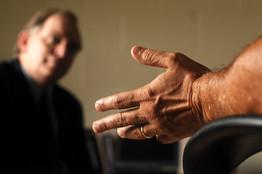While there are several reasons why mental health advocates want to ban sexual orientation change efforts, I want to focus on the recent push to legislate bans on the practice by licensed professionals.
legislate bans on the practice by licensed professionals.
Historically, therapists who treat gays with an aim to change them have viewed homosexuality as a developmental disorder. Some may also think same-sex sexual behavior is immoral, but principally the use of therapeutic techniques is driven by a belief that there is something psychologically wrong with someone who is attracted to the same sex. If the right techniques can be applied, eventually the GLB person will experience a shift in psychological perspective and find the opposite sex attractive. In short, homosexuality is an illness to be cured.
As most readers know, this view of same-sex orientation isn’t held by any medical or mental health professional organization today. Only a tiny group of practitioners hold to this view and they are among those who are fighting legislative efforts to ban sexual orientation change efforts. When legislators craft bills to stop treatment of same-sex orientation, they are hoping to stop efforts to cure something that isn’t a disorder.
To me, this is a sensible stance. No disorder, no need for treatment.
On the other hand, many religious traditions disagree with same-sex sexual behavior. They discourage such behavior as inconsistent with their moral teachings. Churches and religious groups have the right to teach this and advise their members in keeping with their principles. When people ask for their advice or opinion, churches can teach their views. In fact, anyone can teach and speak any view about homosexuality.
However, when a person joins a learned profession and gets a state license to practice that profession, there are certain restrictions that come along with that choice. Mental health professionals are not clergy. We have a role to enhance the mental health of our clients and curing non-existent diseases doesn’t seem to me to be a part of that mandate. If clergy need to speak against certain behaviors, that is their right and the state’s regulation of mental health professionals cannot stop them.
I do have sympathy for those clients who believe that their same-sex attractions result from some historical trauma. In fact, there is a very small subset of people for whom those factors might be relevant to an understanding of their overall personality, including their sexual interests. I also believe that those people can continue to receive therapy, under these laws, if the treatment is not framed as a direct effort to change orientation.
Ultimately, I believe this is an issue of regulation of mental health professionals and not one of religious liberty. Since there is no universe in which sexual orientation change efforts are effective, why would mental health professionals make space for them? The rare exceptions can be accommodated via other frameworks (e.g., identity exploration, trauma recovery). Religious views will continue to be shared and any challenge to them will not succeed. We can coexist.
For more information on helping non-affirming same-sex attracted people live in keeping with traditional sexual ethics without engaging in sexual orientation change efforts, see the following articles and websites:
Sexual Identity Therapy Framework
Institute for the Study of Sexual Identity
A New Therapy on Faith and Sexual Identity (WSJ)
Living the Good Lie (NYT)